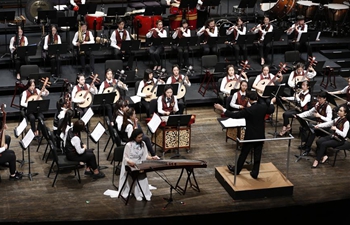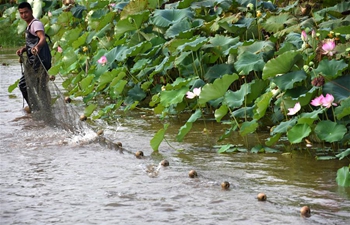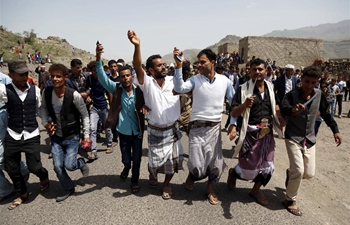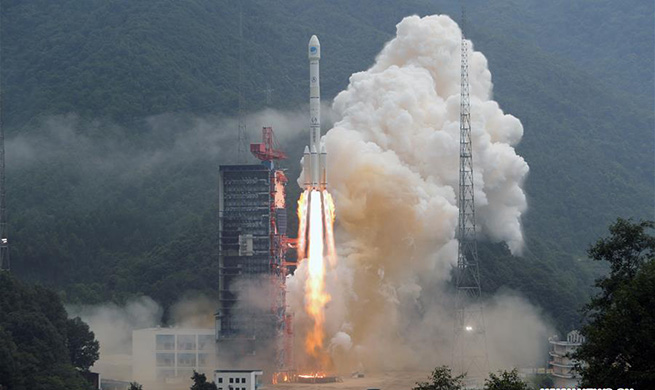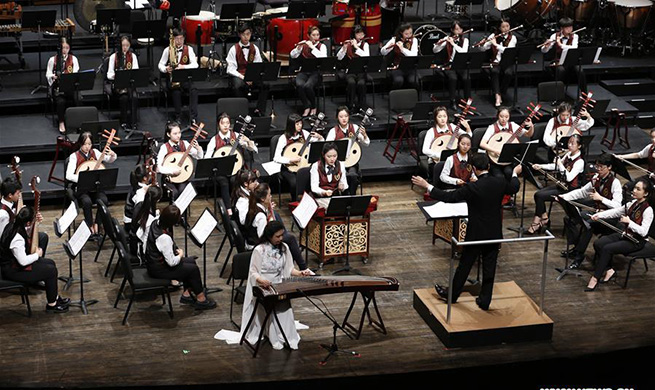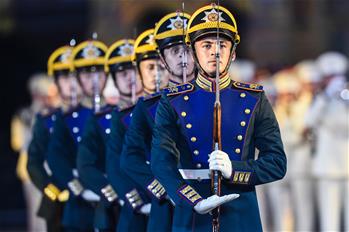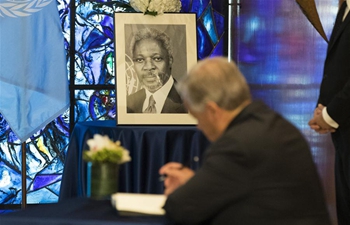ISTANBUL, Aug. 25 (Xinhua) -- As the Syrian army prepares to retake the Idlib province from radical groups, analysts are warning about Turkey facing the threat of mass migration and dealing with armed rebels who may also attempt to cross the border into Turkey.
Turkey is confronted with a huge problem that is almost impossible to settle in a fully satisfactory way, Haldun Solmazturk, a former army general, told Xinhua.
Having largely cleared other parts of the war-torn country from radical Islamist rebels, the Syrian army has recently reinforced troops around Idlib, the last major bastion for radical jihadists in Syria.
The province is home to an estimated population of 2.5 million, among it around 50,000 armed rebels.
It is widely argued that many rebels would at some stage flock to the Turkish border or areas under Turkish troops' control in northern Syria after the Syrian army offensive begins.
"Possible Turkish efforts to send the rebels to their countries of origin would fail as no country would admit them since they are seen as terrorists," said Solmazturk, who chairs Incek debates at the Ankara-based 21st Century Turkey Institute.
According to some estimates, foreign fighters may make up as much as around half the rebels in Idlib.
Ilhan Uzgel, an analyst on international relations, thinks Turkey will have to face a certain wave of migrants from Idlib in any scenario.
"Turkey will bear the burden of this migration while radical rebels who may disguise as civilians among the migrants would pose a serious threat," he told Xinhua.
In the view of Solmazturk, the only way for Ankara to better cope with the threat is to cooperate with Russia, which, like Iran, has militarily supported the Syrian army operations against rebels.
Turkey has already hosted some 3.5 million Syrian refugees.
As a Syrian army attack looks imminent on Idlib on the Turkish border, Turkey's foreign and defense ministers met on Friday with their Russian counterparts in Moscow in a bid to deter an offensive on the province.
The two ministers, Mevlut Cavusoglu and Hulusi Akar, and Turkey's intelligence chief Hakan Fidan, also met later the same day with Russian President Vladimir Putin.
According to a statement from the Russian Ministry of Defense, the Russian side presented Akar and Fidan with "proposals regarding normalization of the situation in Syria's northwest."
Solmazturk does not think Ankara could talk Moscow out of launching an offensive on the rebels whom Russia has often accused in recent months of trying to carry out attacks on Russian positions in Syria.
Neither Russia, nor Syria nor Iran would think of delaying the operation against Idlib as the Syrian army is marching toward victory against rebels in the war that has raged on for seven years, said Solmazturk.
Noting the Syrian government would neither give up on Idlib nor on the areas under Turkish control in northwestern Syria, the retired general said Turkey should come up with a proposal covering not only Idlib but the whole Syria.
The reference to "the situation in Syria's northwest" in the Russian statement seems to imply that Moscow is also seeking a deal with Turkey that will cover the Turkish army-held areas in Syria, spoils of two military operations launched by Ankara respectively in August 2016 and January this year.
In remarks apparently targeting the United States and Turkey on Wednesday, Russian Foreign Minister Sergei Lavrov said that any foreign troops in Syria without Damascus' invitation must leave.
If the radical groups could be persuaded to leave Idlib under a deal with Syria, Turkey would face a thinner wave of migration toward its border, said Uzgel.
Earlier this week, the leader of an al-Qaida-linked rebel group in Idlib, Abu Mohammed al-Golani, vowed to fight against a Syrian military offensive. He also warned that those who surrender would be seen as traitors.
Following a meeting with Lavrov in Moscow, Turkish Foreign Minister Cavusoglu warned that a military solution in Idlib would come to mean a disaster for Syria's future.
Saying an offensive would result in the killing of hundreds of thousands of people and the displacement of millions of others, Cavusoglu said "this would lead to a disaster. That's why we must work together on how to resolve (the issue) rather than attack Idlib."
Ankara, Moscow and Teheran are partners in a joint effort known as the Astana process aimed at ending clashes and setting the stage for a political settlement in Syria. Idlib is one of the four areas under rebel control which were designated as de-escalation zones last year.
"Keeping Idlib as a de-escalation zone is very important for Syria, the fight against terrorism and on humanitarian grounds," said Cavusoglu.
The Syrian army, backed by Russian and Iranian forces, has taken back the other three de-escalation zones from rebels earlier this year. Most of the rebels in those zones were allowed to go to Idlib under a deal with the Syrian government.
The al-Qaida-linked Hayat Tahrir al-Sham alliance controls much of the Idlib province, while Turkey-backed rebels, who came together under the name of the National Liberation Front, holds the rest of the territory.
Based on the Astana deal, Turkey has established a total of 12 observation posts in Idlib to monitor cessation of hostilities, involving some 1,000 Turkish troops.

